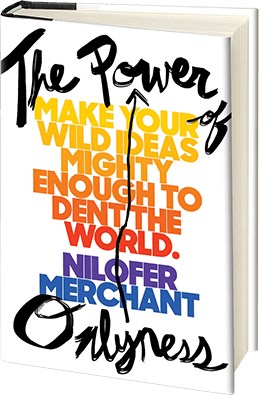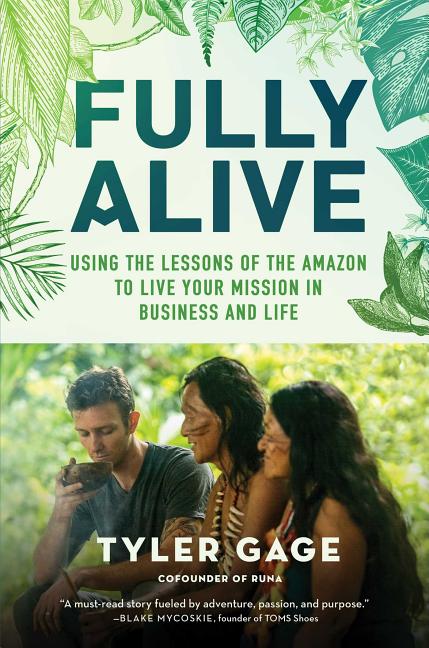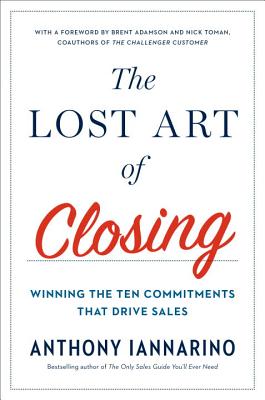Business Books to Watch in August
August 03, 2017
These are the books we'll have our eyes on in August.
In order of publication date, these are ten books the staff at 800-CEO-READ will be digging deeper into in August.
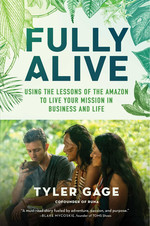 Fully Alive: Using the Lessons of the Amazon to Live Your Mission in Business and Life by Tyler Gage, Atria Books
Fully Alive: Using the Lessons of the Amazon to Live Your Mission in Business and Life by Tyler Gage, Atria Books
Fully Alive tells the story of an astoundingly successful young entrepreneur’s immersion in Amazonian indigenous spirituality, its life-changing impact on him, and how he integrated the lessons he learned to build a successful, socially responsible company, live a purposeful life, and make a difference in the world.
Building a start-up is like being thrust into the middle of the Amazon rainforest: living every day on the edge of your comfort zone, vulnerable to the unexpected challenges constantly being thrown your way, and constantly shifting to meet daily demands and do everything and anything you can to survive, let alone thrive.
Vulnerable, raw, and deeply transparent, Fully Alive reveals powerful tools and lessons that can teach all of us how to grow toward and beyond our personal edges, no matter our circumstances.
Tyler Gage shares his spiritual adventures and the business savvy that helped him create RUNA, a pioneering organization that weaves together the seemingly divergent worlds of Amazonian traditions and modern business, demonstrating how we can dig deeper to bring greater meaning and purpose to our personal and professional pursuits.
From suburban youth to immersion in the Amazon to entrepreneurial success, Tyler's journey clearly shows that passion and opportunity can be found in the most unexpected places. Captivated by a rare Amazonian tea leaf called guayusa that had never been commercially produced, Tyler started RUNA to partner with the indigenous people of Ecuador to share its energy and its message with the world.
Using the spiritual teachings, lessons, and healing traditions of the Amazon as his guide, Tyler built RUNA from a scrappy start-up into a thriving, multimillion-dollar company that has become one of the fastest-growing beverage companies in the United States. With the help of investors such as Channing Tatum, Leonardo DiCaprio, and Olivia Wilde, RUNA has created a sustainable source of income for more than 3,000 farming families in Ecuador who sustainably grow guayusa in the rainforest. Simultaneously, RUNA has built a rapidly scaling nonprofit organization that is working to create a new future for trade in the Amazon based on respectful exchange and healing, not exploitation and greed.
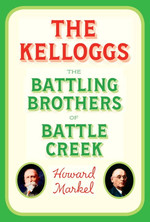 The Kelloggs: The Battling Brothers of Battle Creek by Howard Markel, Pantheon
The Kelloggs: The Battling Brothers of Battle Creek by Howard Markel, Pantheon
“What’s more American than Corn Flakes?” —Bing Crosby
From the much admired medical historian (“Markel shows just how compelling the medical history can be”—Andrea Barrett) and author of An Anatomy of Addiction (“Absorbing, vivid”—Sherwin Nuland, The New York Times Book Review, front page)—the story of America’s empire builders: John and Will Kellogg.
John Harvey Kellogg was one of America’s most beloved physicians; a best-selling author, lecturer, and health-magazine publisher; founder of the Battle Creek Sanitarium; and patron saint of the pursuit of wellness. His youngest brother, Will, was the founder of the Battle Creek Toasted Corn Flake Company, which revolutionized the mass production of food and what we eat for breakfast.
In The Kelloggs, Howard Markel tells the sweeping saga of these two extraordinary men, whose lifelong competition and enmity toward one another changed America’s notion of health and wellness from the mid-nineteenth to the mid-twentieth centuries, and who helped change the course of American medicine, nutrition, wellness, and diet.
The Kelloggs were of Puritan stock, a family that came to the shores of New England in the mid-seventeenth century, that became one of the biggest in the county, and then renounced it all for the religious calling of Ellen Harmon White, a self-proclaimed prophetess, and James White, whose new Seventh-day Adventist theology was based on Christian principles and sound body, mind, and hygiene rules—Ellen called it “health reform.”
The Whites groomed the young John Kellogg for a central role in the Seventh-day Adventist Church and sent him to America’s finest Medical College. Kellogg’s main medical focus—and America’s number one malady: indigestion (Walt Whitman described it as “the great American evil”).
Markel gives us the life and times of the Kellogg brothers of Battle Creek: Dr. John Harvey Kellogg and his world-famous Battle Creek Sanitarium medical center, spa, and grand hotel attracted thousands actively pursuing health and well-being. Among the guests: Mary Todd Lincoln, Amelia Earhart, Booker T. Washington, Johnny Weissmuller, Dale Carnegie, Sojourner Truth, Henry Ford, John D. Rockefeller, Jr., and George Bernard Shaw. And the presidents he advised: Taft, Harding, Hoover, and Roosevelt, with first lady Eleanor. The brothers Kellogg experimented on malt, wheat, and corn meal, and, tinkering with special ovens and toasting devices, came up with a ready-to-eat, easily digested cereal they called Corn Flakes.
As Markel chronicles the Kelloggs’ fascinating, Magnificent Ambersons–like ascent into the pantheon of American industrialists, we see the cast changes in American social mores that took shape in diet, health, medicine, philanthropy, and food manufacturing during seven decades—changing the lives of millions and helping to shape our industrial age.
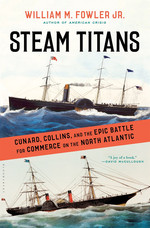 Steam Titans: Cunard, Collins, and the Epic Battle for Commerce on the North Atlantic by William M. Fowler Jr., Bloomsbury USA
Steam Titans: Cunard, Collins, and the Epic Battle for Commerce on the North Atlantic by William M. Fowler Jr., Bloomsbury USA
The story of the epic contest between shipping magnates Samuel Cunard and Edward Collins—between Great Britain and America—for commercial dominance on the North Atlantic.
Between 1815 and the American Civil War, the steam engine transformed the Atlantic into a pulsating highway over which steamships traveled with astounding regularity, cutting by two thirds the transit time across the Atlantic. Great Britain and America were each other’s best customer: American raw materials flowed eastward, while goods, capital, people, and technology crossed the Atlantic westward. This story of economic expansion is dramatic in its own right, but it also gave rise to the extraordinarily intense competition between Samuel Cunard and Edward Knight Collins. Scions of rival shipping lines—one in New York, the other in Liverpool—for more than a decade they vied for control of the globe’s most lucrative trade route and the vast wealth their ships could deliver. The stakes were high, and high-risk; they used all the tools of technology, finance, and politics to cope with the inevitable, sometimes crushing perils of the sea.
Chronicling the dramatic shift from sail to steam, tracing the paths of ships, information, and money, master historian William M. Fowler brings to life the spectacle of this generation-long struggle for supremacy, during which New York rose to take her place among the greatest ports and cities of the world. It was the opening act in the drama of economic globalization that is still unfolding today.
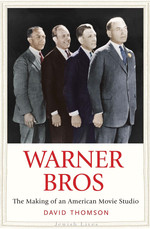 Warner Bros: The Making of an American Movie Studio by David Thomson, Yale University Press
Warner Bros: The Making of an American Movie Studio by David Thomson, Yale University Press
Behind the scenes at the legendary Warner Brothers film studio, where four immigrant brothers transformed themselves into the moguls and masters of American fantasy.
Warner Bros charts the rise of an unpromising film studio from its shaky beginnings in the early twentieth century through its ascent to the pinnacle of Hollywood influence and popularity. The Warner Brothers—Harry, Albert, Sam, and Jack—arrived in America as unschooled Jewish immigrants, yet they founded a studio that became the smartest, toughest, and most radical in all of Hollywood.
David Thomson provides fascinating and original interpretations of Warner Brothers pictures from the pioneering talkie The Jazz Singer through black-and-white musicals, gangster movies, and such dramatic romances as Casablanca, East of Eden, and Bonnie and Clyde. He recounts the storied exploits of the studio’s larger-than-life stars, among them Al Jolson, James Cagney, Bette Davis, Errol Flynn, Humphrey Bogart, James Dean, Doris Day, and Bugs Bunny. The Warner brothers’ cultural impact was so profound, Thomson writes, that their studio became “one of the enterprises that helped us see there might be an American dream out there.”
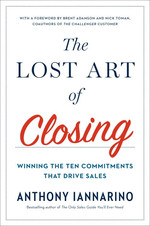 The Lost Art of Closing: Winning the Ten Commitments That Drive Sales by Anthony Iannarino, Portfolio
The Lost Art of Closing: Winning the Ten Commitments That Drive Sales by Anthony Iannarino, Portfolio
If you want to succeed in sales, you need to know how to close. Anthony Iannarino, star sales blogger, consultant, speaker, and author of the national bestseller The Only Sales Guide You’ll Ever Need, lays out the new rules of closing.
Closing the deal is the most crucial step in the sales process. Yet most salespeople are following outdated, incorrect, and harmful advice telling them to aggressively and forcefully go for the hard sell—or to sell so softly that they are afraid to ask for any commitments at all! They’ve heard “always be closing” and “never be closing.” But neither of those mantras are true in the complex sales landscape we have today. Closing now is all about building trust with your clients and moving them down the path of ten commitments…. all the way to the dotted line.
Iannarino argues that in a world with many competitors vying for the same clients and with clients who can do their own research, closing a sale is really about gaining commitments and doing all you can to build a relationship with your prospective client. In his rebuttal to conventional and disappointing “sales wisdom”, Iannarino will teach readers to:
- Develop deep relationships with clients by implementing closing strategies that build trust and help prospective clients understand the value of committing to move forward in the process.
- Proactively, but not aggressively, ask for commitments without guilt or embarrassment about being pushy, manipulative, or self-oriented—all things that destroy trust.
In a field rife with misperceptions about how to close a deal, Iannarino’s book will be necessary reading for all sales people—to help them streamline the sales process and win more deals, faster.
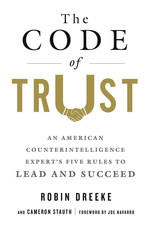 The Code of Trust: An American Counterintelligence Expert's Five Rules to Lead and Succeed by Robin Dreeke & Cameron Stauth, St. Martin's Press
The Code of Trust: An American Counterintelligence Expert's Five Rules to Lead and Succeed by Robin Dreeke & Cameron Stauth, St. Martin's Press
The former director of the FBI’s behavioral analysis division shows readers how to use trust to achieve anything in business and in life.
Robin Dreeke is a senior agent at the FBI and an 18 year veteran of the Bureau. He was, until recently, the head of the Counterintelligence Division’s Behavioral Analysis Program where his primary mission was to thwart the efforts of foreign spies and recruit American spies. His core approach in this mission was to inspire reasonable, well-founded trust among people who could provide valuable information.
The Code of Trust is based on the system Dreeke devised, tested, and implemented during years of field work at the highest levels of national security. Applying his system first to himself, he rose up through the FBI, and then taught his system to law enforcement and military officials throughout the country. The Code of Trust has since elevated executives to leadership and changed the culture of entire companies, making them happier and more productive as morale soars.
Inspiring trust is not a trick, nor is it an arcane art. It’s an important, character-building endeavor that requires only a sincere desire to be helpful and sensitive and the ambition to be more successful at work and at home. The Code of Trust is based on 5 simple principles:
- Suspend Your Ego
- Be Nonjudgmental
- Honor Reason
- Validate Others
- Be Generous
All a reader needs to be successful is the willingness to spend eight to ten hours learning a system that took Robin Dreeke almost a lifetime to create.
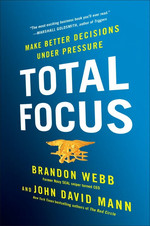 Total Focus: Make Better Decisions Under Pressure by Brandon Webb, John David Mann, Portfolio
Total Focus: Make Better Decisions Under Pressure by Brandon Webb, John David Mann, Portfolio
A former Navy SEAL sniper turned media CEO and New York Times bestselling author teaches business leaders how to make the best decisions under pressure.
Webb learned all about performing while experiencing heart-pounding stress during his four deployments as a Navy SEAL sniper in the Middle East, Afghanistan, and Africa. After returning to civilian life, he started his first business venture—and failed miserably. He realized that his big mistake was neglecting to apply what he already knew about focus under pressure. By drawing on the lessons of his SEAL training and early business struggles, Webb went on to build a second business, a media network called Hurricane, which today has an audience of millions and a valuation close to $100 million.
Now Webb deconstructs the decision-making DNA of the most effective snipers, and shows you how to develop the same mental acuity in civilian life. His stories range from his own experiences to those of other Special Operations warriors and great entrepreneurs, like Solomon Choi of 16 Handles, Matt Meeker of BarkBox, and Betsy Morgan of The Huffington Post and TheBlaze. They illustrate seven hard-won principles of decision-making:
Laser focus is not the same thing as tunnel vision. You need total situational awareness to stay out of danger and adapt to changing circumstances.
Once the first shot is fired, nothing goes according to plan anyway, so don’t get stuck in the trap of over-analysis. The key is to act decisively and adapt on the fly.
Instead of avoiding difficult experiences, “embrace the suck” and understand that pain is temporary and learning is priceless. Facing challenging obstacles forces you to develop the skills you need to achieve your goals.
By following in the path of a generation of legendary snipers, you’ll find the clarity of mind you need to make key decisions and accomplish your mission, whatever it takes.
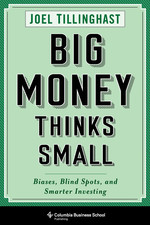 Big Money Thinks Small: Biases, Blind Spots, and Smarter Investing by Joel Tillinghast, Columbia University Press
Big Money Thinks Small: Biases, Blind Spots, and Smarter Investing by Joel Tillinghast, Columbia University Press
Investors are tempted daily with misinformation. They make lucky bets that breed false confidence, and their high-stakes gambles can take an emotional toll. How can anyone stay focused in such a volatile profession?
In Big Money Thinks Small, veteran fund manager Joel Tillinghast urges investors to act cautiously and follow five primary steps to successful investing: (1) know yourself; (2) make decisions based on your own knowledge; (3) select trustworthy and capable colleagues and collaborators; (4) avoid businesses that seem destined to fail; and (5) always search for bargains. Patience and methodical planning will pay far greater dividends than rash, bold investments. Through sensible instruction, Tillinghast teaches readers how to ask the right questions in any investing situation and think objectively and generatively about portfolio management.
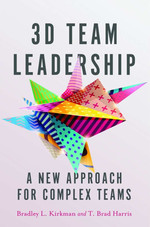 3D Team Leadership: A New Approach for Complex Teams by Bradley L. Kirkman & T. Brad Harris, Stanford Business Books
3D Team Leadership: A New Approach for Complex Teams by Bradley L. Kirkman & T. Brad Harris, Stanford Business Books
To create a fuller portrait of team behavior, this book introduces an innovative, "3-D" framework that takes into account the individuals who make up a team, the subgroups that form within and between teams, and the team as a whole. Delivering practical guidance rooted in scholarship, this is a thoughtful and straightforward guide.
Many organizations believe that high-functioning teams hold the key to breakthrough thinking, superior customer service, and high-quality products. But, all too often, leaders and managers fail to support teams so that they can deliver on their promises. For instance, many leaders ask for teamwork, but only reward and evaluate individual performance; focus on the group at the expense of individual members; or leave team members to sort out their differences, leading to the formation of unhealthy cliques.
In 3D Team Leadership, Bradley L. Kirkman and T. Brad Harris present a dynamic new model for maximizing team performance. Previous books have treated teams as groups of people working interdependently, an approach that overlooks two crucial components: the individuals who make up the team and the subgroups that form within and between teams. To create a fuller portrait of team behavior, Kirkman and Harris propose an innovative "3D" framework that takes into account all three factors. Drawing on their own research, best-in-class studies, and extensive consulting, they show leaders how to properly diagnose the state of their teams, hone in on the element that needs attention, and seamlessly shift focus among the three components of teamwork as time goes on. Delivering practical guidance rooted in scholarship, 3D Team Leadership is a thoughtful and straightforward guide for the complex challenge of teaming today.
 The Power of Onlyness: Make Your Wild Ideas Mighty Enough to Dent the World by Nilofer Merchant, Viking
The Power of Onlyness: Make Your Wild Ideas Mighty Enough to Dent the World by Nilofer Merchant, Viking
A leading business strategist explains how to identify your passion, use social media to find others who share a common purpose, and act together to bring about change
Most of us long to make a dent in the universe, to leave a world that’s different and better than the one we’re born into. Until now the only way to pursue this goal systematically was by joining an institution - a big company, the military, the church - and rise in the ranks. But today we’re living at the leading edge of an entirely new era when ordinary people can, by using social technologies, connect with others to achieve extraordinary things without the backing of powerful people and organizations.
In Onlyness, Nilofer Merchant, a respected thought leader in business and entrepreneurship who won the Thinkers 50 Award in 2013 as someone who will “strongly influence the way managers manage and lead organizations going into the future,” offers a guidebook for making a difference. It shows how to embrace what makes you and your particular passion truly unique, tap into that passion, find and enlist allies, and get real results by guiding and galvanizing a crowd of like-minded peers. It explains how to make the crucial leap from “me” to “us,” how to avoid starting a movement where everyone feels good but nothing actually happens, and how to get things done in people-powered collaborations that create lasting change.
Filled with accounts of ordinary people that exploited the possibilities of this new era, Onlyness demonstrates how the power of one can be tapped into to enlist the power of many. People like Ryan Andresen, a teenager who came out as gay and swayed the Boy Scouts of America to include “different” kids like him. Or Kimberly Bryant, who established Black Girls Code to provide young and pre-teen girls of color opportunities to learn in-demand skills in technology and computer programming; or Jamie Heywood, who began Patients Like Me as a web community which is now a home for 350,000 users to report their experiences of 2,400 different conditions. These change agents had to blaze their own trails because they possessed no map, and their stories illuminate a path for the rest of us.
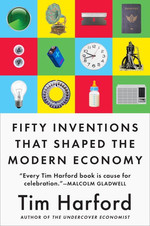 Fifty Inventions That Shaped the Modern Economy by Tim Harford, Riverhead Books
Fifty Inventions That Shaped the Modern Economy by Tim Harford, Riverhead Books
An unexpected history of the world economy seen through the 50 inventions that shaped it most profoundly, by the bestselling author of The Undercover Economist and Messy.
Who thought up paper money? Why was the horse collar as important to progress as the steam engine? How did the humble spreadsheet turn the world of finance upside down? Fifty Inventions That Shaped the Modern Economy paints an epic picture of economic change in an intimate way by telling the stories of the tools and ideas that had far-reaching and unexpected consequences. From the simple coin to Bitcoin, from the canal lock to the jumbo jet, author and economist Tim Harford recounts each invention’s own curious, surprising, and memorable story.
Step by step, readers will start to understand where we are now, how we got here, and where we might go next. Hidden connections will be laid bare: How the bar code undermined family corner stores. Why the gramophone widened inequality. How barbed wire shaped America. In the process, Harford introduces to readers the characters who developed some of these inventions, profited from them, and were ruined by them. He traces the economic principles that helped explain their transformative effects. And he shows what lessons readers can learn to make wise use of with future inventions. The result is a wise and witty book of history, economics, and bigraphy.


